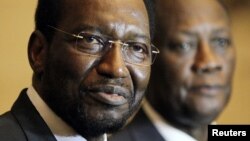DAKAR — Mali's interim president, Dioncounda Traore, said Sunday he plans to overhaul his country's post-coup political transition. He called on Malians to accept foreign help in retaking the northern part of Mali from al-Qaida-linked Islamist militants who have been in control of the region since April. It was the first time Mr. Traore addressed the nation since being severely beaten by pro-military government protesters in May.
"Mali will not fall apart," said Traore in his first public address since returning to Bamako.
He sought to bolster morale and solidify support for the transitional government that has been weak and unpopular.
Traore said Mali is at a "crucial turning point." He said he firmly believes the challenges Malians face can be surmounted.
The interim president laid out a proposal to overhaul the transitional government that was put in place in April, following negotiations between the Economic Community of West African States, ECOWAS, and the short-lived military government that seized power in March.
Traore proposed that the transition be led by a High Transitional Council composed of the president and two vice presidents. One vice president would be in charge of defense and security, and the other would oversee political affairs and will lead a transitional authority that would consist of members of Mali's political parties and civil society.
According to Traore, the president, prime minister and other government ministers would not be eligible to run for office in the next elections.
According to Traore, the president, prime minister and other government ministers would not be eligible to run for office in the next elections.
He said the two vice presidents and the membership of the National Transition Council would be named as soon as possible. He said the new "government of national unity," requested by regional mediators, should be in place within two weeks. He did not mention coup leader Captain Amadou Sanogo, who has been accused of continuing to interfere in the government and carrying out a violent repression against opposition to the coup.
Anti-government protesters stormed the presidential palace in May and severely beat Traore in his office. He went to France for medical treatment following the attack and returned last Friday.
Traore said he has forgiven his attackers and he invited Malians to forgive one another.
During his absence, heavily armed al-Qaida-linked militants have solidified their hold on the northern half of the country. The Islamist militants, along with Tuareg rebels, seized the territory following the coup in Bamako.
Traore is expected to request a U.N. Security Council mandate for a regional intervention force. ECOWAS says the lack of a U.N. mandate is the only hurdle to the deployment of its 3,000-member military force to Mali.
Malians have been resistant to the idea of foreign troops on Malian soil. However, Traore said they should appreciate and accept the assistance of the international community in regaining lost territory and restoring democracy.




